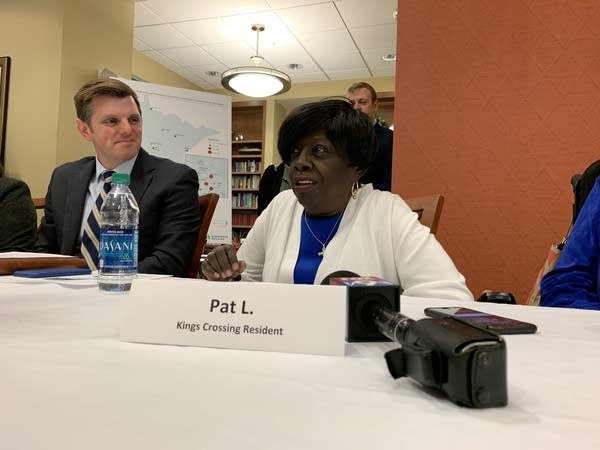Housing subsidies are latest area of shutdown concern

Go Deeper.
Create an account or log in to save stories.
Like this?
Thanks for liking this story! We have added it to a list of your favorite stories.

Gov. Tim Walz said Thursday that his administration has begun exploring how the state could maintain housing subsidies for thousands of low-income residents with federal payments increasingly in doubt because of the partial government shutdown.
Walz held a roundtable at a St. Paul apartment building where many of the residents receive rental subsidies through federal programs. There is growing concern about what could happen to those subsidies -- Section 8, disability grants and elderly rental assistance among them -- if the shutdown stretches on much longer. Vouchers and other assistance are covered through February but could lapse come March.
It’s just the latest area where Minnesota might step in to cover functions normally handled by federal agencies. Walz said so far about $150 million from the state has been plugged in without assurances of reimbursement once the shutdown ends.
Officials are closely watching federal food nutrition programs, where continuing payments are weeks from becoming dicey. Minnesota recently helped 93 percent of Supplemental Nutrition Assistance Program enrollees access their February allowances, and Walz said steps are being taken to watch out for the remaining 7 percent.
Turn Up Your Support
MPR News helps you turn down the noise and build shared understanding. Turn up your support for this public resource and keep trusted journalism accessible to all.
Walz, a DFLer and former congressman, said it’s unconscionable that people who depend on those subsidies could be in jeopardy amid the month-long shutdown prompted by a border security funding standoff.
“You will never be able to convince me that holding these people hostage and terrorizing them over their housing has anything to do with the discussion” over a border wall, Walz said. “And I don’t care how valid that discussion is.”
At least 90,000 people in Minnesota get some form of federal help with rent payments.
Retired clerical worker Pat Lamb, a 72-year-old who lives in the Kings Crossing building that the governor visited, said 70 percent of her rent is covered through federal programs and she also receives federal food assistance.
“If you don’t know what it’s like to not have a place to live, I do. And I’ve done it,” Lamb said. “If you don’t know what it’s like not to have food, I’ve done that, too.”
She said she’s hopeful for a resolution to the standoff between Republican President Donald Trump and a politically divided Congress before her own situation turns dire.
“I just pray,” she said. “I keep saying, ‘It’s going to be alright.’”

Walz said he must make a decision by mid-February about how the state would step in. But Minnesota Housing Commissioner Jennifer Ho, a former federal Housing and Urban Development official, said it’s difficult to determine the exact need because so little information is flowing from relevant agencies in Washington.
“The money is moving in a lot of different places. What we’re trying to do right now is get our arms around that,” Ho said.
“When I was at HUD during the last shutdown, we were doing everything we could to communicate to the people that we owed money to what was going to happen,” she added. “We are not getting the information that we need to help manage expectations. And we need the leadership that’s there to start telling us what they’re going to do to help us solve the problem they’re creating.”
Public housing authorities across Minnesota fear that a prolonged partial government shutdown will soon ripple through programs they administer.
Authority officials say federal rent subsidies are on course to dry up after February, and new vouchers for people in need aren’t being issued amid the uncertainty. Already long waiting lists could grow.
Buffy Beranek, executive director of the Southeastern Minnesota Multi-County Housing and Redevelopment Authority, said public housing providers might have to dig into reserves to cover costs for residents if rental payments lag. She appealed to Walz and his administration.
“We need your help. We can carry this for a very short period of time. We don’t have the cash reserves to take this on for months,” Beranek said. “We will be in crisis mode come March 1st.”
The Metropolitan Council is the largest Section 8 provider in Minnesota. Council Chair Nora Slawik said a notice was recently sent to program participants to let them know they were covered through February.
“In the event the shutdown stretches into March, the council will do what it can do. We have reserves but we don’t know exactly what that looks like,” Slawik said. “We do not want to put anyone in jeopardy. That’s our message.”
Payments covering thousands of units across Minnesota are at stake. There is concern that some landlords will opt out of voucher-based programs if federal rent subsidies become too unreliable.
Walz said that will only exacerbate what is already an acute need for affordable housing. He said the prospect of long-term damage from a partial shutdown is frustrating.
“People who will make the analogy that this is just like running out of gas and when this is over we’ll just put gas back in and drive on like nothing happened -- that is absolutely false,” Walz said. “It’s like running the car out of oil. It’s making it so that we’re not going to be able to pick back up and it’s leaving us behind."


